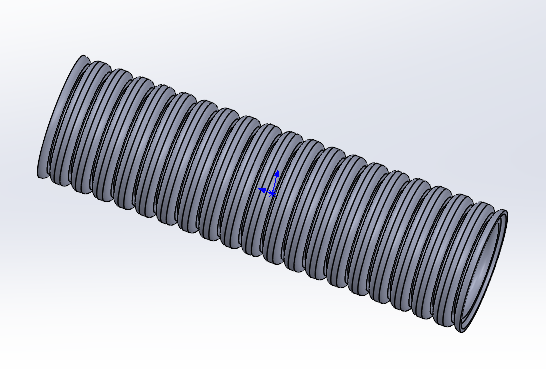Hello
I have a flexible plastic corrugated sheath

I want to design it folded: follows a simple curve, a radius for example.
The rings deform: tight on the inner R and spread on the outer radius.
Any ideas?
Hello
I have a flexible plastic corrugated sheath

I want to design it folded: follows a simple curve, a radius for example.
The rings deform: tight on the inner R and spread on the outer radius.
Any ideas?
Hello
I think the only way in SW is to use the flex function.
After that, you have to see to get to the desired dimensions / constraints.
EDIT
By moving the planes we can have this as well.
Hello @olivier.david @FUZ3D
I made a tutorial a few years ago (for the Solid Agora - Sniff ![]() forum) and at your disposal for help on this function
forum) and at your disposal for help on this function
Kind regards
The question is, is it necessary to make a corrugated sheath in such a realistic way?
Knowingly, this may make your assembly slow down for not much.
The Øext and int space requirement is sufficient most of the time.
(at worst a thread representation to make a semblance of girding)
nice your result, by the way I can't do it again, can you show us the parameters of the function? to see what has been selected?
or the file depending on the version of SW.
Hello!
I will also use the " distort " function. I've already done a tutorial
https://www.lynkoa.com/contenu/utilisation-des-foctions-hélice-et-déformer-0
I also have the video version (made for a challenge)
Attached is my configuration of the function
The Bending function is the easiest for me - But kudos for the Deformation!
Glad our forum was able to help you!
You can close the topic by choosing the best solution suggestion.
Kind regards
You're serious here!
I'll answer you next time
Thanks by the way, to @DoubleL and @Lynkoa15 for their demonstrations on the deform function.
It's always interesting to see other methods/applications.
As I always tell our trainees who are starting out in 3D, there is not only one way to obtain the same result, the most important thing is that the method suits you and that it is not more complicated / waste of time and above all adapted to your object. (if equation /. family of parts there is for example)